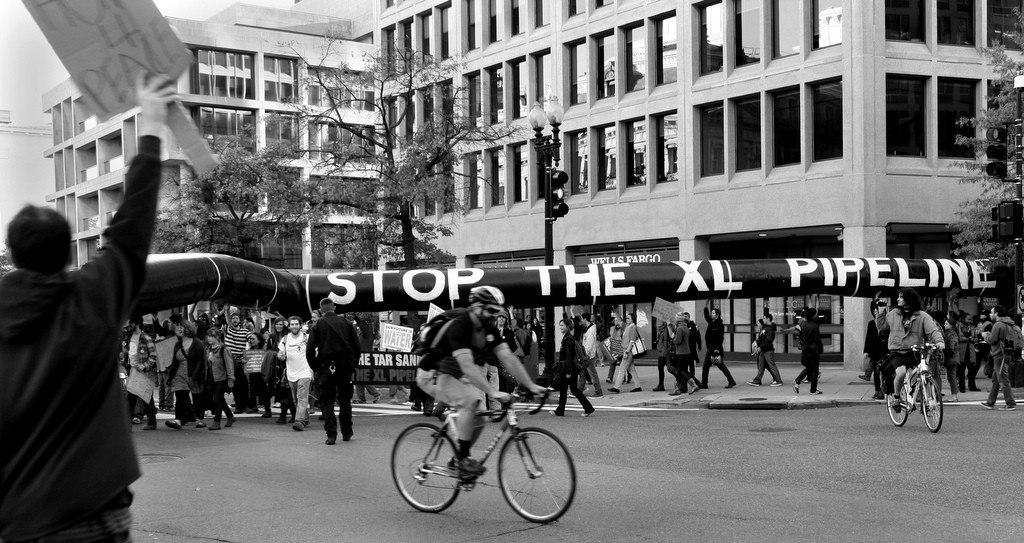
By Joe Madden
Like every other American with media access, I have no choice but to acknowledge the Keystone XL “debate." It is everywhere … and it has spurred impassioned pleas from environmentalists, patriotic calls to duty from conservatives and even one of Jon Stewart’s more exhaustive rants.
Now a bill authorizing the completion of the pipeline is poised to pass both houses and is awaiting a likely veto from President Barack Obama. Opponents argue that the pipeline will not add to U.S. energy independence and that it will contribute to climate change and a multitude of other negative environmental and social outcomes. Transcanada, the company seeking rights to build the pipeline, says: “Keystone XL Pipeline will be the safest and most advanced oil pipeline operation in North America. It will not only bring essential infrastructure to North American oil producers, but it will also provide jobs, long-term energy independence and an economic boost to Americans.”
Regardless of where one stands on the issue, the focus of the current debate is misplaced.
We don’t have a “supply problem” when it comes to fossil fuels in the U.S. or anywhere else. We have a “demand problem." Whether Keystone XL is approved and extended or not is irrelevant in the scheme of things. As long as there is market demand for the oil contained in Canadian tar sands, it will be extracted, refined, find its way to market — (via rail, alternate pipeline, etc.) and be burned. Climate change, environmental destruction caused from extraction and/or any other consideration will not prevent this from happening.
Moral and ethical arguments are no match for market demand -- especially inelastic market demand.
The “War on Drugs," which began 44 years ago with a proclamation from then President Richard Nixon, provides a consistent and enduring example of this simple truth. It is unlikely that many folks would argue for the long-term benefits of heroin, cocaine, crack or crystal meth use on an individual or societal level. But a multitude of studies and market data suggest that the drug trade is and has been “alive and well” in spite of the Herculean efforts to quell supply for more than four decades. It has even been suggested that any temporary disruptions in supply drive price up and encourage new market entrants on the supply side -- demand begets supply.
Drug trafficking declines only when demand declines.
Like a sobering addict coming off a binge, it's high-time for our global citizenry –including those chomping at the bit to cash-in on the economic spoils contained in the bitumen of Alberta -- to assess KXL from the demand side of the equation.
Scientists say we have a “carbon budget” of approximately 565 GtCO2e (billion tons of carbon dioxide equivalent greenhouse gases) that we can emit by 2050 if we are to have a fighting chance of staying within 2 degrees of temperature rise to avoid “dangerous climate change." Proven fossil fuel reserves total 2,975 GtCO2e — five times our “budget." So, like heroin, cocaine or meth — all of which can be generated (grown, “cooked," etc.) on an ongoing basis -- supply is not the issue.
At current rates, we will exceed our carbon budget between 2030 and 2035. That date is close. My 7-year-old son and 6-month-old daughter will only be 28 and 21 respectively in 2035.
The only way to avoid dire consequences is to drastically increase resource efficiency with regards to greenhouse gas (GHG) output.
This means economizing ... and making smart choices in accordance with our carbon budget. Acknowledging that all fossil fuels are not created equal is a first step. From a carbon perspective, six saleable barrels of tar sands oil equates to roughly seven saleable barrels of oil extracted from conventional means. Thus, when GHG impact is included, tar sands oil looks far more costly (read “INVESTMENT RISK”) than conventional crude.
Forget altruism, ethics and the like ... For the folks calculating the spoils of tar sands development based on demand projections that have yet to be correlated with carbon constraints, it might be time to revisit demand assumptions that include global carbon constraints prior to sinking additional capital into activities associated with their development.
Drug addicts do not have the benefit of adjusting demand based on a budget that defines consequences of future drug use, nor do drug lords receive such data to assess future demand curves.
In the case of tar sands oil, both the “addict” and the “pusher” have the information to make informed choices.
Image credit: Emma Cassidy
Based in San Francisco, Joe Madden sits on the Board of Directors at EOS Climate.
TriplePundit has published articles from over 1000 contributors. If you'd like to be a guest author, please get in touch!














